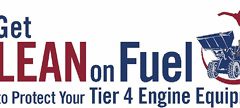Fuel quality is critical to keep Tier 4 engines running smoothly, which is why the Association of Equipment Manufacturers (AEM) released information to help equipment owners and users keep their machines up and running.
AEM outlined five key actions that help protect Tier 4 engines, “because while the new engines reduce diesel emissions and protect our health and the environment, the fact is they are rather finicky about fuel,” said William “Bernie” Bernhard, AEM technical and safety services manager.
Bernhard explained that today’s Ultra-Low Sulfur Diesel (ULSD) is very different from the diesel of just a few years ago. “Among other things, it is subject to change and contamination as it moves from the refinery to the engine, making storage, temperature, age and filtration, and related factors critical in maintaining fuel quality,” said Bernhard.
AEM member company experts came together through the association to develop these guidelines as a way to spread more awareness of the importance of diesel fuel quality.
Five Steps to Maintain Fuel Quality
C – Commit to understanding your T4 engine.
L – Learn the facts about today’s fuel.
E – Evaluate your fuel source and fuel handling.
A – Always follow manufacturer guidelines.
N – Never take your role for granted.
Commit To Understanding Your T4 Engine – Today’s engines use extremely precise components and very high fuel pressure. These changes require cleaner fuel and better filtration to maintain expected performance, fuel economy and component life.
Tier 4-compliant diesel engines are dramatically different from their predecessors. Their high-pressure, common-rail (HPCR) fuel systems use extremely precise components, making them less tolerant of poor fuel quality. Because fuel pressure is as high as 45,000 psi, any contaminants can create erosion that negatively impacts engine performance, fuel economy and component life.
Learn The Facts About Today’s Fuel – Fuel standards alone can’t ensure fuel is clean enough to meet T4 engine needs. Today’s fuel chemistry creates more challenges with water and allows for growth of bacteria and fungi that can shut you down.
Today’s Ultra-Low Sulfur Diesel (ULSD) contains 99 percent less sulfur, so it has many different qualities than past diesel fuels. Refining techniques and additives may vary from supplier to supplier, so it’s important to buy your fuel from someone who maintains best practices throughout their storage and distribution process. Also be aware that today’s diesel has an average “shelf life” of about six months, and that extended transportation can change the characteristics of diesel fuel between the refinery and your tank.
Evaluate Your Fuel Source And Fuel Handling – Take cleanliness very seriously. Ask the right questions to choose a supplier that uses best practices for fuel storage, distribution and handling. Ensure that your fuel handling systems are clean and use proper filtration.
If you use biodiesel, follow manufacturers’ recommendations. Biodiesel fuel blends vary by state from B2 to B20. Manufacturers recommend B2 to B5 levels. Recommended biodiesel suppliers should meet BQ-9000 standards.
Always Follow Manufacturer Guidelines – They are experts on the unique requirements and maintenance needs for your machine. Make sure all your equipment operators understand and follow the guidelines on fuel for your machine.
Create maintenance logs with established intervals for inspection, cleaning and filter changes. Keep a spare fuel filter on-hand for each engine and use only manufacturer-approved fuel filters and fuel additives. Drain water traps daily. Refill fuel tanks at the end of a work shift to reduce condensation and only use clean fuel containers dedicated for diesel use.
Never Take Your Role For Granted – Everyone has an important part to play. Whether you are involved with bulk fuel or handling supplier’s fuel, doing your part is critical to ensure the uptime and performance you expect on your equipment.
With Tier 4 engines, manufacturers have increased the maintenance responsibilities of the equipment owner/operator. Therefore, proper diesel fuel sourcing, storage and supply are critical. High-quality OEM-recommended fuel filters are the key to engine longevity, but don’t ignore basic fuel handling “hygiene,” such as cleaning fuel nozzles, changing filters regularly and keeping fuel fresh. Also remember that biodiesel blends require a new level of maintenance needs.
AEM, www.aem.org/clean

